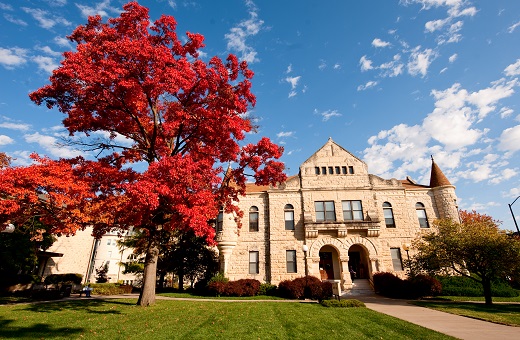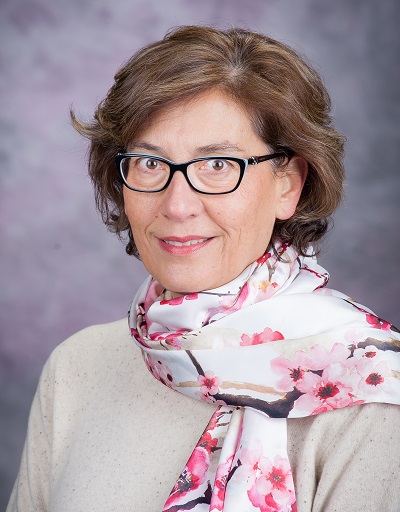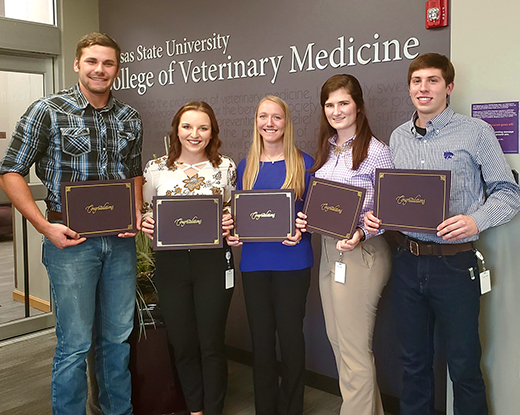10/23/19
K-State Current - October 23, 2019
K-State Current is a weekly news update for the Kansas Board of Regents to apprise the Regents on a few of the many successes and achievements made by K-State faculty, staff and students.

K-State News
College of Architecture, Planning & Design receives top rankings from DesignIntelligence
 The Kansas State University College of Architecture, Planning & Design's graduate programs in architecture, interior architecture and landscape architecture continue to rank among the best in the nation according to the annual rankings by DesignIntelligence. The organization recently released its rankings of accredited professional programs in architecture, landscape architecture and interior design/architecture for 2020.
The Kansas State University College of Architecture, Planning & Design's graduate programs in architecture, interior architecture and landscape architecture continue to rank among the best in the nation according to the annual rankings by DesignIntelligence. The organization recently released its rankings of accredited professional programs in architecture, landscape architecture and interior design/architecture for 2020.
This year, the college's graduate program in interior architecture ranked seventh nationally and first among programs at public institutions. The graduate landscape architecture program ranked eighth in the nation overall and fifth among programs at public institutions. The graduate architecture ranked 24th in the nation and 10th among programs at public institutions.
DesignIntelligence's rankings are based on national surveys of hiring professionals, deans and department chairs, and students in the design disciplines. Hiring professionals are asked, based on their experiences in the last five years, which programs are best preparing students for a future in the profession. Deans and department chairs are asked what programs they most admire, and students are surveyed on their satisfaction with the educational institution in which they are currently enrolled or graduated from in the past year.
Reflecting the professions' appreciation for the college's programs, graduates in the interior architecture & product design and landscape architecture programs are first in most hired and architecture graduates are second in most hired rankings among similar-sized graduate programs.
"The College of Architecture, Planning & Design, or APDesign, ranks prominently across the entire spectrum of design, said Tim de Noble, dean of the college and fellow of the American Institute of Architects.
"This year's DesignIntelligence rankings once again point to the national reputation of excellence embedded in APDesign," de Noble said. "More importantly, the breadth of these rankings, including in skill focus areas, reflects our professions' appreciation for the comprehensive and cross-disciplinary educational model unique to APDesign. Clearly, no other program at a state institution garners such accolades across the disciplines as APDesign at K-State."
The graduate programs in APDesign also earned high marks from DesignIntelligence in several design education focus areas. The graduate architecture program ranks among the top ten in seven of the 12 skilled focus areas and in the top four programs among public institutions in these seven focus areas. Interior Architecture ranked first in all twelve categories among the Council for Interior Design Accreditation (CIDA) accredited programs in public universities. The landscape architecture program ranks in the top five in all 12 design focus areas, including the top ranking in two areas: construction materials and methods, and engineering fundamentals. The program ranks second, behind only Harvard University, in healthy built environments, practice management, project planning and management, and transdisciplinary collaboration across architecture, engineering and construction.
“The value professionals place on our graduates is tremendously gratifying, said Stephanie Rolley, professor and head of the landscape architecture and regional and community planning department. "Ranking at the top of all 12 focus areas of professional practice and as the No. 1 program firms hire from in our size category affirms the excellent quality of our students and faculty and the K-State approach to landscape architecture."
Along with the program honors, both de Noble and Rolley were again included on DesignIntelligence's 25 Most Admired Educators list.
"It is a true joy to help students and faculty succeed, so the Most Admired Educator recognition is especially meaningful and inspirational to me," said Rolley, who received the honor for the third time.
It is de Noble's third time to be included on the prestigious list.
"My recognition is merely a reflection of the pride I take in leading an incredible faculty and staff driven by a belief in the capacity of design to positively change our society and culture while stewarding our environment," de Noble said.
APDesign's Robert Condia, professor of architecture and fellow of the American Institute of Architects, and Howard Hahn, associate professor of landscape architecture, have previously been included in the annual most admired educator listing.
DesignIntelligence is an independent company focused on the design and construction industry. It publishes DesignIntelligence Quarterly four times per year, including the results of an industrywide survey of design professionals perceptions of design education programs released in its third quarter edition annually.
K-State receives national award for cybersecurity, research efforts
 The Offices of the Vice President for Research and Information Technology Services at Kansas State University have been recognized with an International Data Group CSO50 award for the Research Information Security Enclave, or RISE, project.
The Offices of the Vice President for Research and Information Technology Services at Kansas State University have been recognized with an International Data Group CSO50 award for the Research Information Security Enclave, or RISE, project.
The national annual award recognizes organizations for security projects and initiatives that demonstrate outstanding business value and thought leadership.
"This award is evidence of the level of commitment at Kansas State University to continuing to not just maintain, but to increase our research efforts in a secure and compliant manner," said Peter Dorhout, vice president for research. "The value and importance of providing this resource to our faculty cannot be diminished, as operating without this system in place would significantly limit our ability to successfully compete for federal funding."
RISE enables K-State to continue pursuing sponsored research that includes security-controlled information even as the U.S. government is implementing increased requirements for safeguarding controlled unclassified information, or CUI. In addition, the enclave allows K-State to not only meet contractual obligations but also to partner with federal sponsors in safeguarding information and data. The offices of the Vice President for Research and Information Technology Services collaborated to develop a Microsoft Azure-based CUI system to help researchers at K-State more easily comply with regulations.
"This award is the culmination of a strong collaborative effort of the teams from the offices of the Vice President for Research and Information Technology Services working closely with Microsoft," said Gary Pratt, chief information officer. "This work exemplifies the excellence that comes from a team committed to the success of research at Kansas State University."
CUI is information provided by, collected or maintained on behalf of the executive branch of the U.S. government, and aligns with CUI registry categories. Grants that are awarded that meet these conditions must safeguard all information to at least the National Institute of Standards and Technology, or NIST, 800-171 standard. NIST 800-171 consists of 110 physical and IT-related security controls.
"The RISE solution is revolutionary for protecting electronic export controls compliance research," said Cheryl Doer, associate vice president for research compliance. "This ensures K-State's export-controlled research is protected at the highest levels and restricts access only to those permitted to work on the project, while also allowing multiple researchers to access and work on the restricted data from their own computers."
Kansas State University and other honorees will be recognized at the 2020 CSO50 Conference + Awards, which will take place April 27-29, 2020.
K-State Faculty Highlights
Research funded by the U.S. Department of Defense will offer preventive approach to disease outbreak
 A common approach to disease outbreak has been one that is reactionary in nature — take action after the person is infected and after there is evidence of an outbreak. However, a new tool being developed at Kansas State University will instead provide a risk assessment of individuals becoming infected before it happens and will guide implementing preventive measures.
A common approach to disease outbreak has been one that is reactionary in nature — take action after the person is infected and after there is evidence of an outbreak. However, a new tool being developed at Kansas State University will instead provide a risk assessment of individuals becoming infected before it happens and will guide implementing preventive measures.
Funded by a U.S. Department of Defense, three-year, $868,000 grant, Caterina Scoglio, the LeRoy and Aileen Paslay professor in the Mike Wiegers Department of Electrical and Computer Engineering in the Carl R. Ice College of Engineering, is leading the team effort, PICTUREE: Predicting Insect Contact and Transmission Using histoRical Entomological and Environmental Data.
Co-principal investigator for the project is Lee Cohnstaedt, research entomologist with the USDA-Arthropod-borne Animal Diseases Research Unit in Manhattan. Three Kansas State University doctoral students, Aram Vajdi, Tanvir Ferdousi, and Chunlin Yi, and one software developer, Josh Manning, all in the electrical and computer engineering department, are also a part of the team.
With partners from the U.S. Department of Agriculture Mosquito and Fly Research Unit, Walter Reed Biosystematics Unit and the Army Public Health Center, project participants will develop a computer program to help planners optimize use of provisions and alignment of resources based on estimated risk for arthropod-transmitted pathogens such as the Zika virus and dengue fever.
Current practices for these vector-borne diseases are reactionary and retroactive for human health protection, but the PICTUREE project will provide a proactive and adaptive approach to preventing pathogens from becoming a health threat.
"Using big data, we will develop a decision support platform to assess three risk levels — high, medium and low — of these mosquito-transmitted pathogens, and their current and future outbreak risk at different places around the globe," Scoglio said.
The project is in line with other research on infectious diseases being conducted at Kansas State University and its Biosecurity Research Institute, and what will be conducted at the National Bio-Agro Facility, the nation's foremost animal disease research facility under construction adjacent to the university campus.
K-State Student News
New class of scholars in Veterinary Training Program for Rural Kansas announced
 Veterinary Training Program for Rural Kansas scholars from the College of Veterinary Medicine at Kansas State University. From left: Boyd Roenne, Rachel Jones, Kami Miller, Grace Luebcke and Jackson McCoole.
Veterinary Training Program for Rural Kansas scholars from the College of Veterinary Medicine at Kansas State University. From left: Boyd Roenne, Rachel Jones, Kami Miller, Grace Luebcke and Jackson McCoole.
Five new students in the College of Veterinary Medicine at Kansas State University have been chosen for the largest veterinary scholarship program offered by the state of Kansas: the Veterinary Training Program for Rural Kansas.
This year's recipients are first-year veterinary students Jackson McCoole, Atchison; Rachel Jones, Manhattan; Grace Luebcke, Marysville; and Boyd Roenne, Meriden; and Kami Miller, Rexford.
"The Veterinary Training Program for Rural Kansas program fulfills an important educational and service mission for the state of Kansas," said Bonnie Rush, dean of the College of Veterinary Medicine. "These students completed a rigorous selection process. They will complete additional training beyond the curricular requirements of the professional degree program to prepare them for success in rural practice. Scholarship recipients — past, present and future — create a unique community of supportive colleagues and represent the future of rural veterinary practice in Kansas."
The Veterinary Training Program for Rural Kansas was passed by the state Legislature in 2006 to provide a financial incentive to provide rural areas in Kansas with committed veterinarians. Program participants are eligible for up to $20,000 in loans per year to pay their tuition. Upon completion of their Doctor of Veterinary Medicine, each graduate is required to work at a full-time veterinary practice in one of the 91 Kansas counties with fewer than 35,000 residents. For each year the graduate works in rural Kansas, $20,000 worth of loans are forgiven by the state. Graduates are expected to work four years in a designated county to receive $80,000 in loan waivers.
To date, 96% of graduates are completing or have completed their loan obligation through service. Graduates that do not complete through service are required to repay the loan. The funds are reinvested through the addition of students to the program. Ninety-three percent of graduates who have completed their four-year obligation remain in a qualifying county. Seventy percent remain in the original practice and community they entered after graduation.
The students spend time during the summer and other breaks in the academic year learning about foreign-animal disease preparedness, natural disaster response, rural sociology, small business management and public health. They also spend three weeks in a rural veterinary practice during their senior year, applying the principles of small business management to rural veterinary practice.
Department of Marketing hosts second annual K-State Marketing Symposium
 In an event centered around student and employer interactions, the marketing department recently hosted its second annual K-State Marketing Symposium.
In an event centered around student and employer interactions, the marketing department recently hosted its second annual K-State Marketing Symposium.
Planned by the Marketing Student Advisory Council, the event invited prominent marketing alumni and employers to the College of Business Administration for a day of presentations and networking. The top 50 marketing students were able to meet and mingle with potential employers while gaining insight into what characteristics, qualities and professional habits they should start developing.
Featured speakers at the symposium included David Brotton, vice president of marketing for Purple Wave Auction; Tim Phelps, director of marketing and communications at NetStandard; and Gina Powers, marketing communications manager with Sprint Business.
"This event was a great way for us to bring together students and employers for a day of meaningful networking and interaction," said Esther Swilley, head of the marketing department. "Our students were exposed to many different aspects of marketing for all types of companies as they begin to make decisions about their future careers."